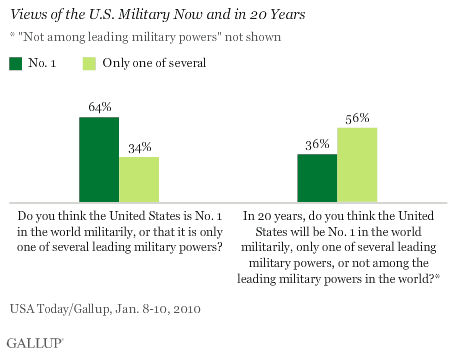A Gallup poll finds Americans think their country is in military decline
To follow up on David's Video of the Day post yesterday, here's a look at Gallup's findings that America is more pessimistic about the long-term trajectory of our military power:

The survey also found that 2/3 of Americans believe the country will be in near constant military conflict for the next 20 years.
Gallup's Frank Newport writes:
Given the nature of these findings, it might be tempting to hypothesize that Americans' pessimism about the nation's military superiority is connected to their beliefs that the U.S. will be engaged in continuous combat situations over that period.This does not, however, appear to be the case. Analysis shows that Americans who think the U.S. will be regularly involved militarily are no less likely to say that the U.S. will be No. 1 militarily in 20 years than are those who believe the U.S. will not be regularly involved in combat.
Americans may not believe that constant military conflict won't impact America's military superiority but it clearly will. It's not like this constant conflict is against another potential military superpower (so that our fighting wears them down as well). We're policing Marja Afghanistan, China is bolstering their position in space.
But I also think Gallup's findings reflect America's appreciation of the impact of China's rise to great power status (as illustrated in a recent WaPo poll). Fox News' Martha MacCallum seemed to take umbrage at the notion that Americans think their military power will be diminished in 20 years, but if you view military strength as a proxy for economic strength, such a belief isn't unfounded. China's economy is growing rapidly, ours is not. Hence China's military strength is growing. It may not be sustainable, but if current trends continue we face an inevitable erosion in our relative position.
We still have a huge lead and one we can likely maintain far into the future, but the more we spend in Afghanistan and Iraq (and Yemen, and Somalia, et. al) the less we have to invest in the types of military platforms that sustain our edge against conventional powers. Of course, big government types believe we should just apportion an ever greater share of our wealth toward the military so that we can do global policing and deter China, but the budget simply won't bear such recklessness.
The American people, as evidenced by the Gallup poll, seem to understand this. Whether it bothers them or not remains to be seen.











